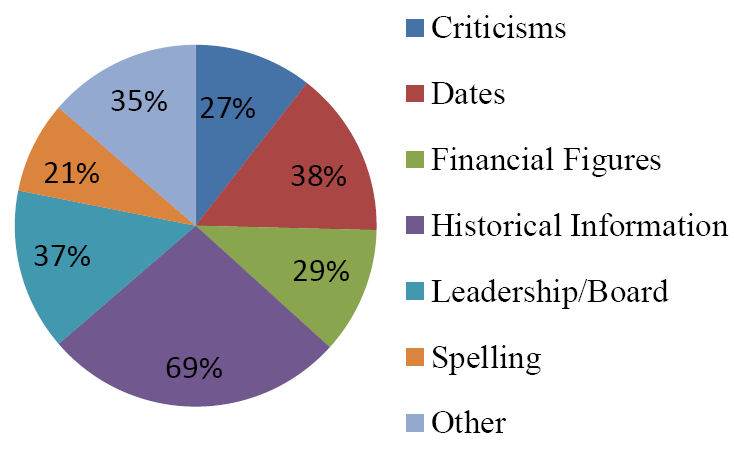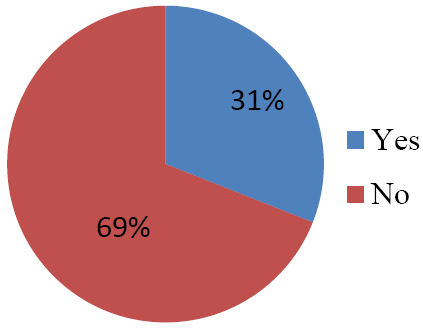Online encyclopedia Wikipedia is a powerful website, constantly used and prominently listed in search engines. This means it has the potential to significantly affect brand reputations. Professionals with PR jobs are therefore keen to make sure their company, and their clients‘ companies, are well described on Wikipedia’s pages. Yet according to Jimmy Wales, co-founder of Wikipedia, they should not edit the encyclopedia, and rules state that you should not edit Wikipedia directly if you are a paid advocate. However, there are other Wikipedia guidelines that ask PROs to fix obvious mistakes.
According to a recent US study, Measuring Public Relations Wikipedia Engagement, nearly one third of respondents (32 per cent) said that there are currently factual errors on their company or client’s Wikipedia articles. The most common error type being historical information (69 per cent).
Wikipedia Factual Errors

Source: Online survey, pretested by Corporate Representatives for Ethical Wikipedia Engagement
Marcia DiStaso, assistant professor of public relations at Pennsylvania State University and author of the report, says that it is vital that companies have accurate information on Wikipedia: “Having incorrect or outdated information is of no benefit to anyone – not the company, the public, or even Wikipedia, yet public relations/communications professionals are frequently challenged, rejected or even banned by Wikipedia from editing the articles of their company or clients.
“Wikipedia may be concerned about public relations/communications professionals making inappropriate edits, but this is a profession built on ethics focused on providing accurate and truthful information in accordance with established codes of ethics.”
Have you ever personally edited your company's or a client's Wikipedia articles?

Source: Online survey, pretested by Corporate Representatives for Ethical Wikipedia Engagement
When it comes to editing the site, nearly one-third (31 per cent) of respondents claimed to have personally edited their company’s or client’s Wikipedia articles. Of those who have directly edited Wikipedia, 32 per cent said that their edits always stuck, while 24 per cent said they usually stuck (about three quarters of the time).
How often do direct edits stick?

Source: Online survey, pretested by Corporate Representatives for Ethical Wikipedia Engagement
Discussing the research, Stevie Benton, communications organiser at Wikimedia UK, which supports Wikipedia (but doesn't control the content on the site), points out that as this was an opt-in study, all respondents were self selecting, and therefore more likely to have an issue with Wikipedia. Benton suggests the best way to correct any errors on the site: “We encourage any PR professionals who find inaccuracies with a client's page to make a note of this on the linked discussion page. We have a very active team of volunteers who will look at the issue and make a change as appropriate. Usually if it's a prominent page responses can be expected within a day or two. If it's a less prominent page it may take longer. If there is a delay for any reason people can send an email to info@wikimedia.org.”
Methodology
The survey used the online tool Survey Monkey and pretested with members of the Corporate Representatives for Ethical Wikipedia Engagement. This included both PROs and Wikipedians. The refined survey was then distributed to members of the Public Relations Society of America, International Association of Business Communicators, Institute for Public Relations, Word of Mouth Marketing Association and National Investor Relations Institute. Each group sent the link to the online survey to all members. The final number of responses was 1,284, primarily from North America (89 per cent).
PRmoment Leaders
PRmoment Leaders is our new subscription-based learning programme and community, built by PRmoment specifically for the next generation of PR and communications leaders to learn, network, and lead.
PRmoment LeadersIf you enjoyed this article, sign up for free to our twice weekly editorial alert.
We have six email alerts in total - covering ESG, internal comms, PR jobs and events. Enter your email address below to find out more:








